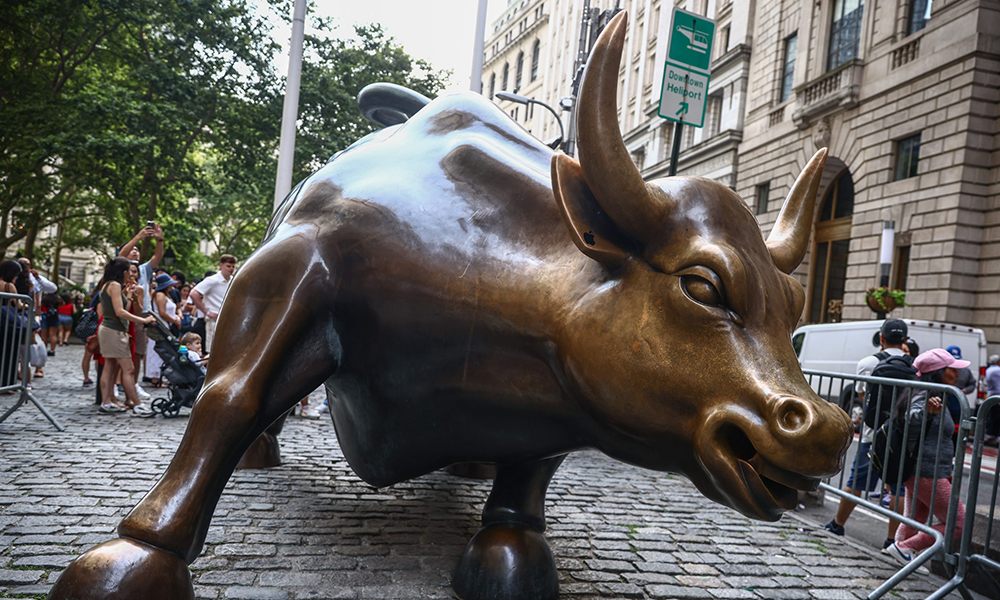
由于对经济衰退的担忧加剧,股市上周遭遇了惨烈的暴跌,但凯投宏观预测,人工智能热潮将继续引领股市走高。
上周五公布的7月就业报告意外疲弱,以及上周四美国供应管理协会制造业指数急剧恶化,均令股市下挫。上周,标准普尔500指数下跌2.5%,纳斯达克指数下跌3.6%,此前因小盘股轮动而飙升的罗素2000指数下跌近7%。
与此同时,对经济增长的担忧引发了人们对美联储将推出更激进的宽松周期的预期,华尔街预计利率最终将下调200个基点或更多。
凯投宏观资深市场经济学家戴安娜·伊万内尔(Diana Iovanel)在上周五的一份报告中表示,股市应该会恢复上涨。
她写道:“对美国经济衰退的担忧重燃,增加了美联储进一步降息的可能性。但我们认为,美国经济阻碍股市反弹的时间不会太长。”
她补充说,股票估值远未达到“经济大灾难”的程度,信贷息差仍接近历史低点。凯投宏观认为,从9月到明年7月,美联储将在每次会议上降息。
伊万内尔表示,经济衰退的可能性不大,在今年下半年的疲软期过后,经济增长甚至会重新加速。
她表示:“因此,我们预计风险情绪不会进一步恶化。其结果是,我们认为经济不会对人工智能引发的泡沫很快再次升温形成太大阻碍。”
事实上,微软(Microsoft)、Meta和谷歌(Google)最近发布的财报显示,它们第二季度在人工智能服务的基础设施、土地和芯片上共花费了405亿美元。每家公司都表示,这些数字明年只会更大。
这些支出最终很可能会流向英伟达(Nvidia)等人工智能芯片供应商身上,后者过去几年的营收和股价都出现了天文数字般的增长。
华尔街的其他人则呼吁投资者不要对就业的突然疲软反应过度。曾担任美联储经济学家的克劳迪娅·萨姆(Claudia Sahm)提出了“萨姆规则”经济衰退指标。她告诉《财富》杂志,她目前并不担心美国陷入衰退,并指出美国家庭收入仍在增长,消费者支出和企业投资仍保持韧性。
不过,目前担任投资公司New Century Advisors首席经济学家的萨姆说,近期劳动力市场的趋势充其量也只能说是疲软。
“随着时间的推移,这是非常准确的,所以不应被忽视,”她补充说,并指出“衰退可能缓慢形成,然后以迅雷不及掩耳之势到来。”(财富中文网)
译者:中慧言-王芳
由于对经济衰退的担忧加剧,股市上周遭遇了惨烈的暴跌,但凯投宏观预测,人工智能热潮将继续引领股市走高。
上周五公布的7月就业报告意外疲弱,以及上周四美国供应管理协会制造业指数急剧恶化,均令股市下挫。上周,标准普尔500指数下跌2.5%,纳斯达克指数下跌3.6%,此前因小盘股轮动而飙升的罗素2000指数下跌近7%。
与此同时,对经济增长的担忧引发了人们对美联储将推出更激进的宽松周期的预期,华尔街预计利率最终将下调200个基点或更多。
凯投宏观资深市场经济学家戴安娜·伊万内尔(Diana Iovanel)在上周五的一份报告中表示,股市应该会恢复上涨。
她写道:“对美国经济衰退的担忧重燃,增加了美联储进一步降息的可能性。但我们认为,美国经济阻碍股市反弹的时间不会太长。”
她补充说,股票估值远未达到“经济大灾难”的程度,信贷息差仍接近历史低点。凯投宏观认为,从9月到明年7月,美联储将在每次会议上降息。
伊万内尔表示,经济衰退的可能性不大,在今年下半年的疲软期过后,经济增长甚至会重新加速。
她表示:“因此,我们预计风险情绪不会进一步恶化。其结果是,我们认为经济不会对人工智能引发的泡沫很快再次升温形成太大阻碍。”
事实上,微软(Microsoft)、Meta和谷歌(Google)最近发布的财报显示,它们第二季度在人工智能服务的基础设施、土地和芯片上共花费了405亿美元。每家公司都表示,这些数字明年只会更大。
这些支出最终很可能会流向英伟达(Nvidia)等人工智能芯片供应商身上,后者过去几年的营收和股价都出现了天文数字般的增长。
华尔街的其他人则呼吁投资者不要对就业的突然疲软反应过度。曾担任美联储经济学家的克劳迪娅·萨姆(Claudia Sahm)提出了“萨姆规则”经济衰退指标。她告诉《财富》杂志,她目前并不担心美国陷入衰退,并指出美国家庭收入仍在增长,消费者支出和企业投资仍保持韧性。
不过,目前担任投资公司New Century Advisors首席经济学家的萨姆说,近期劳动力市场的趋势充其量也只能说是疲软。
“随着时间的推移,这是非常准确的,所以不应被忽视,”她补充说,并指出“衰退可能缓慢形成,然后以迅雷不及掩耳之势到来。”(财富中文网)
译者:中慧言-王芳
The stock market suffered a brutal bloodbath last week as recession concerns shot up, but Capital Economics predicted the artificial intelligence boom will continue to lead the way higher.
The surprisingly weak July jobs report on Friday and the sharp deterioration in the Institute for Supply Management’s manufacturing index on Thursday sank stocks. For the week, the S&P 500 lost 2.5%, the Nasdaq fell 3.6%, and the Russell 2000, which previously soared on a rotation into small caps, tumbled nearly 7%.
Meanwhile, economic growth concerns have raised expectations for more aggressive easing cycle from the Federal Reserve, with Wall Street seeing rates eventually plunging by 200 basis points or more.
In a note on Friday, Capital Economics senior markets economist Diana Iovanel said the stock rally should resume.
“Renewed fears of a US recession have increased the chances of additional rate cuts from the Fed,” she wrote. “But we don’t think that the US economy will stand in the way of an equity rally for much longer.”
Stock valuations are nowhere near indicating an “economic cataclysm,” and credit spreads are still close to record lows, she added. Capital Economics sees the Fed cutting rates at each meeting from September until next July.
Iovanel said a recession is unlikely and growth will even reaccelerate after a soft patch in the second half of this year.
“So we don’t expect risk sentiment to deteriorate much further,” she said. “The upshot is that we doubt the economy will stand much in the way of the AI-fueled bubble picking up steam again soon.”
Indeed, recent earnings reports from Microsoft, Meta and Google indicate they spent a combined $40.5 billion on the infrastructure, land, and chips that power their AI services during the second quarter. And each company indicated that those numbers will only get bigger next year.
Such spending will likely end up at AI chip suppliers like Nvidia, which has seen astronomical increases in revenue and its stock price in the last few years.
Others on Wall Street have called for investors not to overreact to the sudden weakening in jobs. Claudia Sahm, a former Fed economist who developed the “Sahm Rule” recession indicator, told Fortune on Friday that she’s not concerned right now that the U.S. is in a recession, pointing out that household income is still growing while consumer spending and business investment remain resilient.
Still, recent trends in the labor market have looked weak at best, said Sahm, who is now chief economist at investment firm New Century Advisors.
“It’s been very accurate over time, so that shouldn’t be dismissed,” she added, noting that “recessions can build slowly, and then come quickly.”






